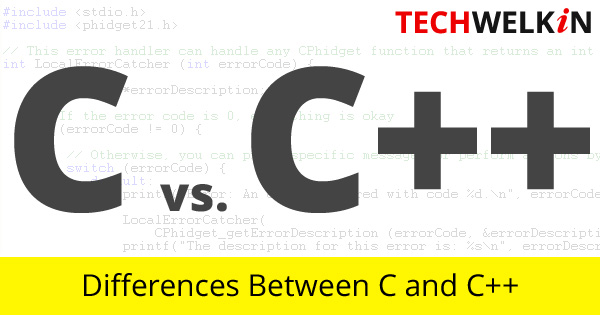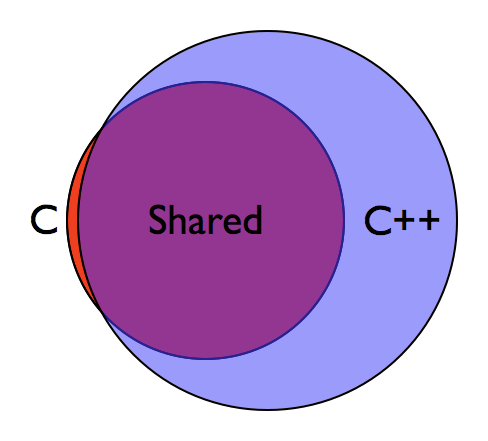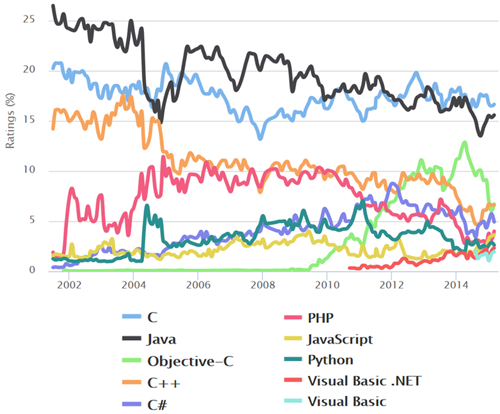Let’s learn the major differences between C and C++ programming languages. C++ offers excellent object orientation programming (OOP) paradigm. Nevertheless, C is still the most widely used in software development.
This is one of the most asked question in the Computer Science courses. If you have done a computer science, information technology or related courses, chances are that you’ve faced this question asking you to explain “major differences between C and C++ programming languages”. And of course, most of you would have listed several such differences. Let’s explore this important question and make a comprehensive list of differences between C and C++
Before, we get into a bit technical stuff let’s recap what are C and C++. Well, C is probably the most widely used computer programming language. C was originally developed by Dennis Ritchie between 1969 and 1973 at AT&T Bell Labs. The reason why C has been so popular lies in the efficiency with which C converts into machine instructions. This efficiency has made the applications written in C super-fast.

C++ is the object oriented and updated version of C language.Therefore, C++ not only shares a lot of C features but also provides new features, such as object-orientation. As a result, most of the C++ compilers can also compile C programs. Following Vann diagram shows how C and C++ share features and how different they are:

The following graph shows the usage of various programming languages between 2002 and 2015.

As you can see, the use C language has been more or less steady during last 14 years. In comparison, Java and C++ have been going out of favor.
So, these are the major differences between C and C++ programming languages. Of course, there are lots of other differences as well, do let me know if you want me to include anything in the list.
Before, we get into a bit technical stuff let’s recap what are C and C++. Well, C is probably the most widely used computer programming language. C was originally developed by Dennis Ritchie between 1969 and 1973 at AT&T Bell Labs. The reason why C has been so popular lies in the efficiency with which C converts into machine instructions. This efficiency has made the applications written in C super-fast.

A list of differences between C and C++ programming languages.
Major differences between C and C++
Following table contains various points where C and C++ programming languages differ from each other.
Following table contains various points where C and C++ programming languages differ from each other.
| # | C | C++ |
|---|---|---|
| 1 | C is a procedural (aka structural) programming language. | In addition to begin procedural, C++ is also an object oriented programming language. |
| 2 | In C language, the solution is achieved through a sequence of procedures or steps. Therefore, C is a function driven language. | C++ can model the whole solution in terms of objects and that makes the solution better organized. C++ is an object driven language. |
| 3 | Concept of virtual functions is not present in C. | C++ offers the facility of using virtual functions. |
| 4 | Operator overloading is not possible in C. | C++ allows operator overloading. |
| 5 | Data in C functions is not secured. Data can be easily accessed by other external functions. | All the data in C++ can be put inside objects. This provides better data security. |
| 6 | C is a middle level language. | C++ is a high level language. |
| 7 | C programs are divided into modules and procedures. | C++ programs are divided into classes and functions. |
| 8 | C programs use top-down approach. | C++ programs use bottom-up approach. |
| 9 | In C, the main() function can be called from other functions. | In C++, the main() function can not be called from other functions. The program execution begins from main() function. |
| 10 | C language does not provide the feature of namespace. | Namespaces are available in C++. |
| 11 | Exception handling is not easy in C. It has to be done by using other functions. | C++ provides exception handling through Try and Catch block. |
| 12 | Inheritance is not possible in C. | Because C++ is an object oriented language, inheritance is possible. |
| 13 | In C, all the variables must be declared at the beginning of a scope. | C++ allows declaring variables anywhere within the scope. This allows us to declare a variable when we use it for the first time. |
| 14 | In C, function overloading is not possible. Function overloading is to use two functions with the same name within a scope. | Function overloading is possible in C++ |
| 15 | Standard Input in C is received through scanf() function whereas standard output is given through printf() function. | C++ uses cin>> and cout>> as standard input and output functions respectively. |
| 16 | C programs are saved in files with extension .c | C++ programs are saved in files with extension .cpp |
| 17 | Mapping between data and functions is difficult in C. | In C++ data and functions are easily mapped through objects. |
| 18 | In C, polymorphism is not possible. | Being a fully object oriented language, C++ offers polymorphism. |
| 19 | C supports only built-in data types. | C++ supports both built-in and user-defined data types. |

C++ contains almost all of C.

Comparison of usage of various programming languages during 2002 and 2015. Source: TIOBE index.
So, these are the major differences between C and C++ programming languages. Of course, there are lots of other differences as well, do let me know if you want me to include anything in the list.







0 comments:
Post a Comment